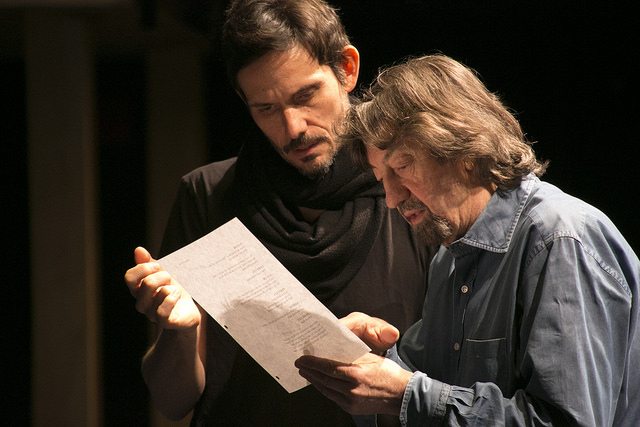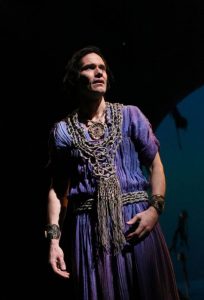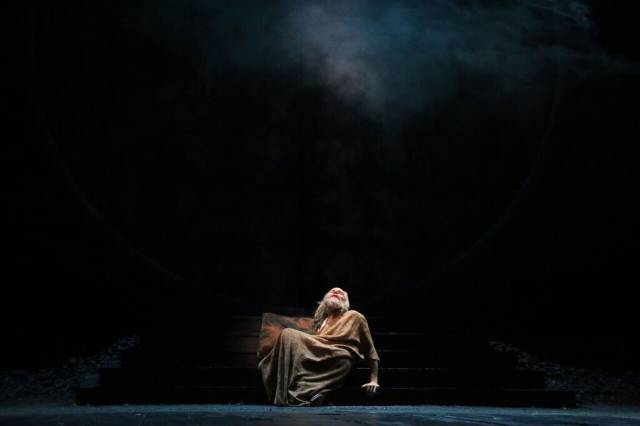

Trevor Nunn’s production of Pericles (playing at the Polonsky Shakespeare Center through March 27) has it all: shipwrecks, tragic priestesses, greedy brothel owners, fake deaths galore and refreshing musical interludes. With so much going on, the production needed an anchor figure which it found in Christian Camargo who brings the title character to life. Aging several decades onstage, the actor goes from portraying a youthful hero, to a monk-like silent figure who has been through just too much. Camargo, who has become one of the preeminent Shakespearean actors of his generation infuses Pericles with sage wisdom and a physicality that has an almost musical theatre feeling to it.
I spoke to Camargo about how he approaches his characters, he shared fascinating insight into how the characters arrive at the time he needs them the most, and spoke about his views pertaining the need for theatre audiences to become more active.
Going through your credits, I get the impression you’re perhaps trying to play a part in every Shakespeare play…
(Laughs) Wouldn’t that be nice? One thing at a time, I’m just glad to have this shot. Of course there’s parts we all want to play, sometimes we get to play them and sometimes we don’t. Pericles is a great part to play an older Shakespeare character, it’s a good part to make that kind of leap from playing young men into middle and older men.
Last time I’d seen you onstage was when you did Romeo and Juliet on Broadway, and I remember at the time there was also an Off-Broadway version running, and a movie version had just come out. Many actors at many points tackle the same Shakespeare characters, so are you ever self-conscious about playing the ultimate version so to speak?
No, the beauty of Shakespeare is there’s no just one way of playing the characters, the language is so unique and particular to that person, there’s so many ways of delivering and creating a character within the framework of the text. That’s why you can see five or six Hamlets and actually enjoy it, it’s more interesting to see how it’s coming through someone else’s body. It’s interesting that all these plays happen at the same time, Pericles has now been done three or four times in different theaters, there’s something in the atmosphere that welcomes these plays at a particular time.
Since there are so many people who’ve played the characters, how do you personally find your way inside the characters?
It’s a meeting, you have the character on one side, yourself on the other, and you walk towards each other hoping that you’ll meet at some point. One takes over in certain areas, and the other way around. It’s a compromise, for example the Pericles I found is a man who’s studied arts, he’s not just a soldier, he’s also a poet and a thinker. There’s a lot of Hamlet within him, as much as a warrior. I found things that resonated with me as an individual and lent them to the character, he also lent things to me, the kingship for instance.

Interesting, I wouldn’t know how to act myself out of a box so to speak…
(Laughs) Basically it’s a compromise between you and the text. I feel text is like clothing, you wear it and all of a sudden it changes you and your perceptions.
Pericles' dilemma when the play starts becomes a lose-lose situation, and it usually becomes impossible not to associate any Shakespearean production with what’s going on in the world. Pericles made me think of persecution for instance.
In my mind there’s lots of parallels with our times, the most obvious is where it’s set, in the Aegean which is a place in constant turmoil, we also have turmoil in that area today, in Syria and the Middle East. There’s also lots of shipwrecks, and we see all these refugee ships that capsize in the news every day. If you look deeper into the play as to what the real message is in my mind for the character and the play, is about individuals who believe in something greater than themselves, which is a huge lesson for today.
If you look at politics regardless of who you’re gonna vote for, but take Donald Trump for example, who really presents himself as an Earth god, and in Western culture we all walk around to a certain extent thinking we’re it, we are gods walking the Earth. We become dictators in our own fields and we lose compassion, heart and selflessness. Pericles is a character who is teaching us about selflessness, and a character with tremendous heart and compassion, to the point that he decides that he’s been so hit by loss, that he shuts down and checks out of the world. He’s tested and he prevails because of his passion and heart. We need more of this, I feel humanity is lost in our fast paced, technologically advanced, politically rabid world. Plays like these help to remind us who we really are, the earth gods of our time, the dictators need to realize there are people they’re hurting.
It’s very timely, even if dramaturgically it’s a very strange play. There are so many different theories about who wrote it and why it does or doesn’t work, but the core of it, is the Latin motto Pericles has during a joust, the motto is never revealed because Shakespeare wanted us to figure out what it was. The interpretation of the motto in the shield is “in hope I live”, and I feel that’s the message Pericles carries, that’s what makes it a beautiful piece. In this digital age we have access to all of the world’s trauma and it’s easy to lose hope. With all of the political unrest in the world and our country, it’s easy to lose hope, but we must bear it.
Do you subscribe to any of those theories about Shakespeare not having written his work?
No, I don’t personally engage in that debate, for me it would be like asking who wrote the Bible. It doesn’t interest me, they’re all beautiful pieces of work, even this work. Whether it was written by several people, or is a rough draft (laughs) I do see a continuous hand throughout the plays, which means whoever wrote it follows a thread, which is what I find so interesting. I find it fun to look at the plays in the continuous sequence in which they were written, it doesn’t matter to me who wrote them.
How is it to work with Trevor Nunn as a director?
If there’s any ego involved, it’s not about the characters I play, but about the directors I get to work with in theatre. I’ve been fortunate to have worked with some great directors, like Richard Eyre, Richard Olivier, and the list goes on...Trevor is the kind of person who makes me feel I can take in so much knowledge from their experience. I really enjoy the willingness he has to achieve a constructive tension between actors and directors, we are able to create a story together. Some directors can get dictatorial, but Trevor is such a stickler for story, and here is a play so full of holes, structurally and tonally, but he’s brilliant at shaping it into a story the audience can follow, and as an actor you don’t always think about that, or we don’t care (laughs), that’s someone else’s department. So it’s lovely to be with someone like Trevor who has such a history, as artistic director he built the Royal Shakespeare Company which is what Theatre for a New Audience was modeled on, so it’s a huge honor to work with him.

Do you think he will convince you to be in a musical?
(Laughs) No, I think this play will be the closest I’ll ever be to being in a musical. As Pericles himself says I am the worst of musical scholars. There are singers, there are actors who sing and I’m below that. I‘ve learned a lot why he uses music, it’s not pure entertainment, it’s a real device, which sounds obvious, but to see Trevor use it makes it clear what music does subconsciously to a story.
You mentioned age and playing older characters which made me think of Skylight, you played Edward in the original Broadway production, and now you’re closer to being able to play Tom. Are there any characters you’re dying to play that you weren’t able to play before?
I wish I could tell you there is this and this and this. What I have found is that the characters find you. It’s been true in my life that certain characters come at a certain time and ask you to play them. Pericles has come to me at a time where he was very necessary, I had personal trials in 2015, healthwise, and even though I’m fine now, there were very scary times, and this play has come to answer a lot of questions I had. Mercutio came at a time when I needed a little more confidence in life decisions, and he’s such a confident character, with tremendous tenacity. Skylight came when I was starting, it was my first real job, I was just out of drama school and here I was with Michael Gambon, who became a mentor figure for me for years, and it was a perfect introduction. That’s mainly theatre, television and film have their own formulas. You’re not doing these characters for the fame or the money, I mean, who wants to go through the terror of opening in a one paper town? There’s no reason to do theatre unless you love it. So you better say yes for the right reasons.
I’ve seen a lot of theatre where there’s been outside forces thinking they’re doing something cool for people to watch, the concept is heightened and cool, but the acting and storytelling aren’t invested and you go: why is this theatre? You don’t need the audience, this should be on television. My gripe with modern theatre is the loss of that other character many forget about which is the audience. In Shakespeare’s time the audience was such an important part of the play, I think that’s why I love doing it. The audience energy turn theatre into a sport.
That’s so fascinating.
It’s a losing battle to try and make people understand this, everyone’s on their tablets and phones, and there’s a disconnection between other people around us. I’m noticing that in younger audiences, they forget they have a role to play as an audience member, they’re not just watching a screen, we as performers get so much from the audience and vice versa. Those who love going to theatre get it, they are not alone. They are with us onstage.
Pericles runs through March 27. For tickets and more click here.